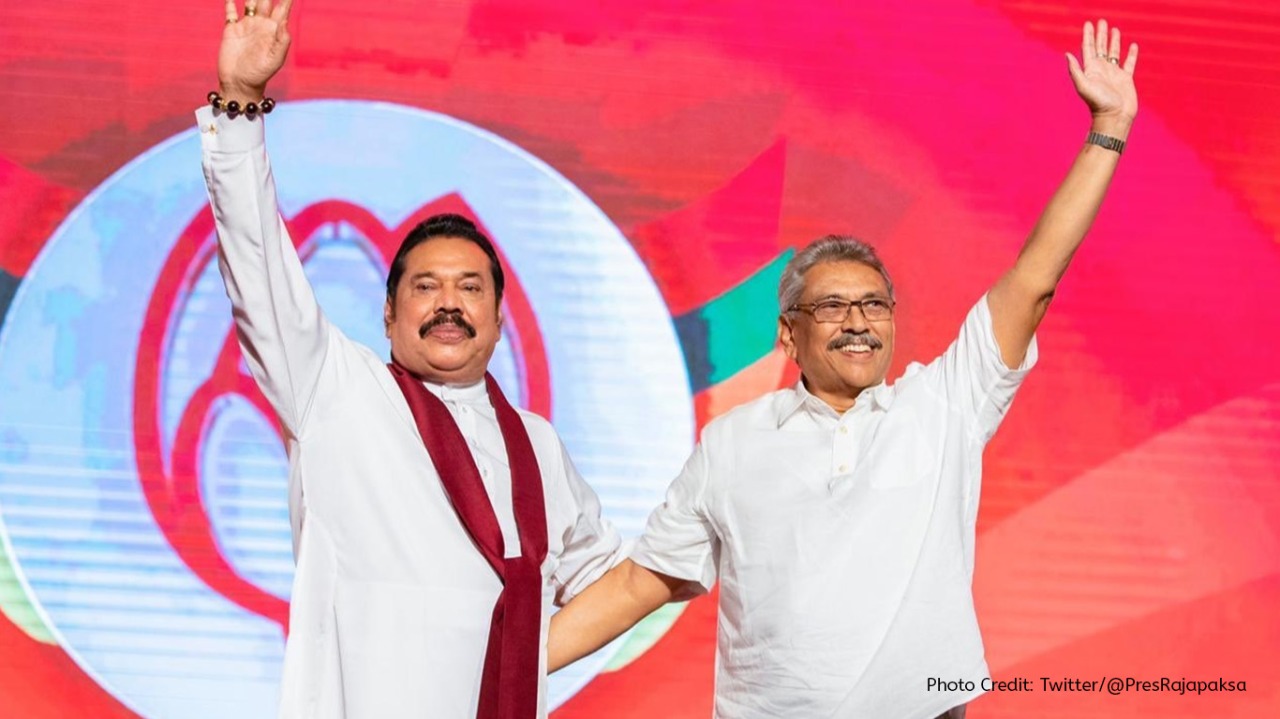On August 5th, Sri Lanka became one of the few countries to have held parliamentary elections in the time of a global pandemic. The result of the elections bears testimony to the fact that the Rajapaksa family still has a very strong foothold in Sri Lankan political landscape. The opposition was completely demolished as Sri Lankan president Gotabaya Rajapaksa declared landslide victory in the recent parliamentary election.
For the past twenty years, the Rajapaksa family has exercised immense control over Sri Lankan politics. The family has been embroiled in one of the greatest controversies in the past where Gotabaya Rajapaksa was arraigned for committing human rights violations and war crimes by earmarking the dissenters. In his interview with the BBC after winning the Presidential elections in 2019, he dismissed all the allegations levelled against him as ‘baseless.’
In 2019 Gotabaya Rajapaksa, the former war-time defence chief, recorded a historical victory and assumed the office of the President of Sri Lanka. His clean sweep in areas of Sinhalese majority helped him bag 52.25% of the votes that were cast in Sri Lanka’s first election since the devastating Easter Sunday attacks.
The eternal reverence and affiliation that the Sri Lankan populace has for the Rajapaksa family can be traced back to the time when he and his brother Mahinda Rajapaksa, the former President, had been in the vanguard of crushing the separatist Tamil Tiger opponents in 2009. This had resulted in the culmination of decades long struggle that had cost a huge loss of life and property and was the reason for exceeding unrest in the country.
His administration has been credited and lauded by many supporters for bringing the much needed stability in the region. Presently, Sri Lanka is one of the very few countries that has had a relatively low count of confirmed coronavirus infections as well as deaths; recorded at a total of 2,839 cases and 11 deaths. The Rajaksa administration has also received praise for effective handling and containment of the pandemic in the country. Even though the parliamentary election in Sri Lanka has been postponed twice because of the pandemic, the country succeeded in holding and smooth;y conducting successful polls amidst such a pressing international health calamity.
Exactly nine months after his spectacular victory in the presidential election, Gotabaya Rajapaksa led his party, Sri Lanka People’s Front (SLPF), to win a two-thirds majority in the present parliamentary elections. The party has won 145 out of 225 seats, with an additional of five more seeds from its allies. His brother Mahinda Rajapaksa is expected to be sworn in as the Prime Minister since he has been already dispensing duties as caretaker since November.
The former Sri Lankan Prime Minister, Ranil Wickremesinghe. has been beaten hollow as he lost all but one out of the 106 seats previously held by his party in the parliament. The party led by him, United National Party (UNP), is one of the oldest parties in Sri Lanka bearing ‘Elephant’ as its symbol. The loss came as a huge blow to Wickremesinghe, as he lost his Colombo seat in stark contrast to a personal record of never having lost a single election since embarking upon politics in 1977.
After securing a ‘super majority’ in the parliament, the promised constitutional amendments by the Rajapaksa lead government can soon be expected to become a reality. The minorities fear that with this dominant majority the Rajapaksas can easily change the constitution which would include the possible increment in the powers of the president; completely undoing the work of the previous government to put into force more checks and balances.
Since the opposition formed by the former Prime Minister Ranil Wickremesinghe, has been brutally crushed now, the main opposition party is led by Ranasinghe Premadasa’s son. Premadasa was the former President of Sri Lanka who was assassinated in 1993.
On the other hand, this resounding victory for the SLPP indicates a spurt in Sinhala nationalism which has worried Sri Lanka’s minority communities. The coming government is a largely Sinhalese Buddhist one where other communities like the Muslims and Tamils are a minority. The Muslim leaders exclaim that the devastating Easter Sunday suicide attacks carried out by Islamist militants last year, have had a destructive bearing upon the Muslim community in Sri Lanka.
Gotabaya Rajapaksa has long remained an extremely controversial figure among the country’s Tamil population. When he was the president from 2005-2015, his regime remained infamous for the abduction, persecution and homicide of numerous journalists who criticized the government. Specifically Tamilians were targeted, as thousands of them disappeared as a result of ‘enforced disappearances’. Many activists fear that a totalitarian and authoritarian regime is looming large over Sri Lanka, predicting unrest in the near future.
On the geopolitical front, China has been said to have invested extensively in the Sri Lankan region so as to keep India at bay vis-a-vis the political scenario in this island country beyond the Indian Ocean. Since the Chinese and the Rajapaksa family have close ties, the momentous victory comes as a good news for China as well. But the Rajapaksas have time and again reiterated that ”India is a family and China is a friend.”
The party symbol ‘Lotus’ happens to be the same as that of the government in power in India which also came in with a sweeping majority. Indian Prime Minister Narendra Modi extended his heartiest congratulation to Mahinda Rajapaksa via his Twitter handle.









